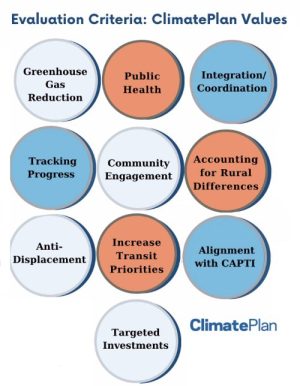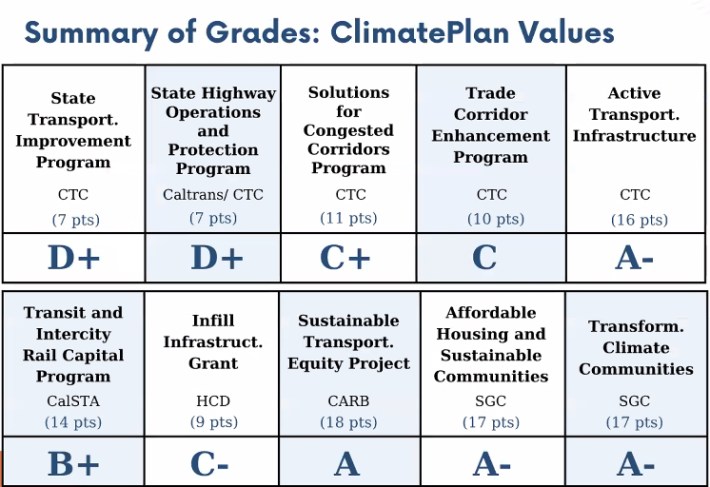ClimatePlan just released a 2022 Report Card on California transportation funding. It grades funding programs according to whether they align with climate, equity, and public health values and goals. It's a simplified analysis to help the public understand how California transportation investments help - or don't - reduce greenhouse gases, improve public health, incorporate anti-displacement policies, increase transit priority, account for differences in rural areas, and align with the state's Climate Action Plan for Transportation Infrastructure (CAPTI).
Programs that are graded include those funded by S.B. 1, which raised and refined the focus of the gas tax several years ago, as well as state and federally funded programs related to transportation infrastructure and infill development. They are:
- Solutions for Congested Corridors (SCCP), S.B. 1, managed by the California Transportation Commission (CTC), with goals to manage congestion, reduce greenhouse gas emissions, and provide better transportation options
- Affordable Housing and Sustainable Communities (AHSC), managed by the Strategic Growth Council (SGC) to support infill and compact development that integrates housing, transit, and active transportation
- Transit and Intercity Rail Capital Program (TIRCP), managed by the California State Transportation Agency (CalSTA), which funds capital improvements for rail and ferry to reduce greenhouse gas emissions, increase ridership, and integrate rail with other transit
- Transformative Climate Communities (TCC), managed by the SGC to support community-led projects that improve environmental, health, and economic outcomes for disadvantaged communities
- State Highway Operation and Protection Program (SHOPP), managed by Caltrans, which focuses on highway maintenance and safety improvements but is not supposed to be used to widen freeways
- Active Transportation Program (ATP), managed by the CTC, to finance projects that promote walking and biking
- State Transportation Improvement Program (STIP), managed by the CTC, which allocates highway funding by formula for regional and interregional projects that include highway capacity increases, rail, and state transit improvements
- Infill Infrastructure Grant (IIG), managed by the Housing and Community Development agency (HCD), which funds infrastructure that supports infill housing
- Sustainable Transportation Equity Project (STEP), managed by the Air Resources Board (CARB), which funds community-led projects to improve transportation options
- Trade Corridor Enhancement Program (TCEP), managed by the CTC, which funds improvements that help move goods more efficiently through federally identified trade corridors
Not all of the programs were likely to score well, according to Nicole Cheng of ClimatePlan, who presented the report card at a recent webinar. Some of them allocate money by formula and haven't yet incorporated state climate goals outlined in CAPTI. However, the point of grading them against ClimatePlan's rubric isn't to compare agencies or programs, but to provide feedback and recommend ways to improve.
The scores are:
Some of the programs, such as the AHSC (A-), are just more likely to score highly because their stated intents are closely aligned with the ones ClimatePlan has defined. The same goes for the Active Transportation Program (A-) - which loses points because it never has enogh funding - and the Transformative Climate Communities grant program (A-), which aims to involve communities in planning for their own resilience and clean mobility.
The programs that allocate funds by formula, such as the SHOPP (D+) and the STIP (D+) - two of the largest programs in the Report Card, did not do so well.
"But that doesn't mean there aren't any opportunities to improve," said Cheng. "The SHOPP, for example, was never meant to meet our goals, but that doesn't mean we can't get it to a C, or even a B." Even those receiving an A can be improved, she added.
The report card includes recommendations on improving those scores. For example, the CTC could improve transparency around projects in the STIP, provide more information on the selection process, prioritize eligible transit projects, and strengthen anti-displacement strategies.
The timing of this report's release is no accident. Between the surplus in California's budget and the federal infrastructure bill, a lot of money is starting to pour into the state for transportation projects and programs, and there is still no clear overall guidance on how to spend it other than through existing programs. If all that money arrives before guidance is adjusted, the state is at risk of continuing to build and fund a transportation system that only accommodates and increases reliance on cars.
There are several caveats and limitations outlined in the report, including its simplicity, which makes it hard to capture important nuances and differences between programs. However, the Report Card is meant as a baseline for further discussion - and as a tool for advocacy for better outcomes, so simplicity was an important factor.
Another limitation is that it had to focus on the intent of programs, rather than outcomes. This is a simple matter of lack of available information.
ClimatePlan sees its report card as an "addendum" to the recently released California Transportation Assessment, also known as the A.B. 285 report, which details the wildly complex and dysfunctional transportation funding landscape in California and the reasons why it is so. That report is a daunting condemnation of the current funding system, and the Strategic Growth Council is still searching for ways to solidify its recommendations for future implementation.
Find the report, and listen to the short webinar presenting it, at the ClimatePlan site, here.







